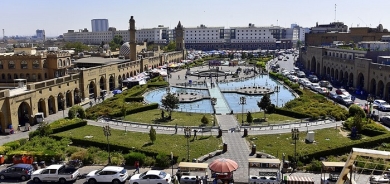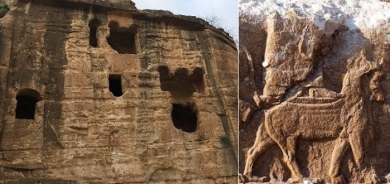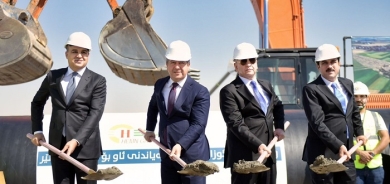Concession fails to quell Egypt clashes; politicians seek early presidential vote

Egypt’s army-backed government said it was preparing to move ousted President Hosni Mubarak to a Cairo prison hospital in an apparent bid to calm protests.
Police forces assaulted protesters at the intersection of Mohammed Mahmoud Street and Noubar Street, just feet away from the Interior Ministry premises, according to a report carried out by Egypt’s al-Masry al-Youm on Monday. Security forces attacked protesters with clubs, and arrested doctors, the newspaper said, citing protesters and reporters at the scene.
The area’s residents complained of the tear gas, which has reached their houses.
Earlier on Sunday, protesters demanding a swift presidential election and an early handover of power by the army fought police for a fourth day outside the Interior Ministry, which they accuse of failing to prevent the deaths last week of 74 people after a soccer match in the Mediterranean city of Port Said.
(Reuters)
The health ministry reporting at least 12 people killed in Cairo and Suez in the backlash since Thursday, according to AFP.
“The demand is that the army step down politically and announce the start of nominations for the presidential election immediately,” said Waleed Saleh, 30, a lawyer and activist with a mask at the ready, speaking near the ministry on Sunday.
Early presidential vote
The soccer disaster and tactics of security forces in dealing with protesters has added to anger at the army's handling of the transition and fuelled calls for the army to return to barracks sooner than it had envisaged.
Political figures and a civilian advisory body to the military have suggested bringing forward a presidential vote to April or May, from the June date foreseen in the transition timetable of the army, which took power after Mubarak quit, according to Reuters.
In a concession to protesters, a ministry official said Interior Minister Mohammed Ibrahim had ordered a hospital at Cairo’s Torah prison be prepared to receive Mubarak, who has until now been in a military hospital.
Protesters have long complained the generals were sparing their former commander the humiliation of jail by detaining him in a military hospital during his trial over the deaths of protesters during the uprising that ousted him.
The hospital in Torah prison, where other ex-Mubarak officials and allies are held, had been deemed by officials not fit to handle Mubarak’s treatment, though the former president’s precise ailment is unclear.
The minister earlier ordered Mubarak-era officials at Torah to be split between five prisons, responding to protesters who accused the authorities of giving them special treatment by keeping them together at Torah. Those at Torah include Mubarak’s two sons and several ex-ministers and top security officials.
Calls for a swifter handover of power to civilians have mounted, and the Muslim Brotherhood which has the biggest bloc in a newly elected parliament, added its voice on Saturday to calls for a faster transition.
An army-appointed civilian council set up to advise the military is proposing accepting nominations for the presidency from Feb. 23, nearly two months sooner than the April 15 date previously announced. This could lead to a vote in April or May.
“If the army adopts that proposal, it will reduce the level of tension,” said Saleh, though he voiced a view popular among activists that the army might still try to influence policy from behind the scenes even with a president in place.
Calling for retribution
Protesters have also been demanding retribution after the soccer deaths and for those killed in protests.
There has been intense speculation about the cause of the soccer stadium disaster, Egypt’s worst. The interior minister has blamed provocations by rival fans although he said there were security shortcomings. Protesters blame the police for allowing or even prodding the violence.
“Those people over there are the reason for the deaths in Port Said,” said 25-year-old Mahmoud Gaber, pointing to the police lines moments before a police riot car advanced and fired teargas on youths in the street, briefly pushing them back.
Many are angry there has not been a deep clear-out in the police force and that officers use the same heavy-handed tactics against protests as in Mubarak’s era.
The interior minister defended the actions of police in dealing with protests, saying officers had shown “unusual self-restraint.” He also urged protesters to stay in Tahrir Square and identify those stirring up trouble.
“There is an insistence (by protesters) on storming the interior ministry and implementing a plot,” said the interior minister, whose predecessor was sacked in a cabinet shuffle in November following similar clashes.
Ibrahim said police did not want to harm any “revolutionaries” among the protesters, but were prepared to confront others “who want to ruin the country.”
Police earlier moved on protester positions in the rock-strewn streets, firing birdshot and detained medics at a field hospital but later released them, a doctor, Mustafa Nabil, told AFP.
Protesters and police have often negotiated brief truces to calm the situation. But on at least two occasions Reuters journalists saw police re-igniting skirmishes by firing teargas or throwing stones at lines of protesters.
But many ordinary Egyptians are increasingly worried by the continued turmoil, and some see the army as the only institution able to guard the nation against a descent into complete chaos.
Near one of the streets where the clashes were occurring, one man, Waleed al-Hakim, criticized the demonstration. “Those are not protesters, those are thugs,” he said.
But others snapped back at him including one youth with a scarf around his face who said: “We are peaceful protesters and they are firing teargas at us. Why? What did we do to them?”
More tension
Newly elected independent parliamentarian Yasser Qadri, a member of the assembly’s national security committee, said his committee was proposing drawing lines near state buildings.
“Those who cross the red line would be dealt with according to the law that gives security the right to protect state buildings from attacks,” he said.
But that could prove a provocation to protesters who have ignored big concrete barriers.
“My heart burned at what happened in Port Said, and we all know that the police are responsible,” said protester Ahmed Farah.
“We don’t want to storm the ministry. We are protesting here because this is the police headquarters.”
The latest clashes come amid a spike in tensions between activists and the ruling military, which blames the unrest on a foreign plot.
Judicial sources told AFP that 44 people including 19 Americans and other foreigners working for aid organizations have been referred to Cairo’s criminal court over alleged illegal funding of their groups.
The suspects 44 are accused of “setting up branches of international organizations in Egypt without a license from the Egyptian government" and of "receiving illegal foreign funding.”
The ruling military receives more than one billion dollars in U.S. aid annually, but it has blamed foreigners for directing activists against it.
The military’s increasingly unpopular rule has been challenged by several bloody protests, in which dozens of people were killed between October and December, amid an increase in lawlessness and an economic downturn.
Also Sunday, saboteurs blew up a pipeline in the Sinai Peninsula that supplies Israel with gas, the 12th such attack in a year.
The attack came the day after the death in prison of an Islamist leader suspected of leading a militant group responsible for previous attacks on the pipeline and on police stations across Sinai.
Interior ministry officials said Mohammed Eid al-Taihi died from a “drop in blood circulation” and forensic doctors detected no signs of torture.














